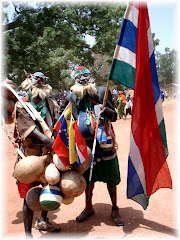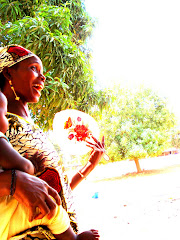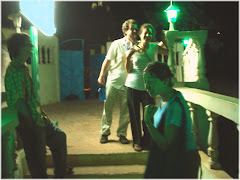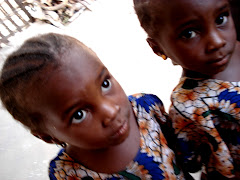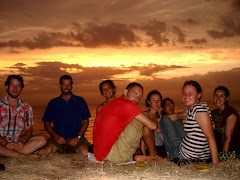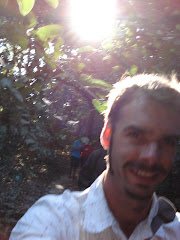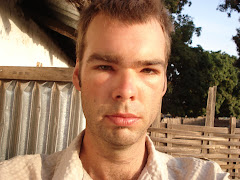Pounding surf, varieties of food, English speakers, internet access, beer, air-conditioning, a dvd player at the hostel. Well it had to end eventually and now I am heading back up to site for another month. So much salt water up my nose! I added some links (below the photographs) to a few blogs by other PCVs in my training group so check them out for more of the Gambian experience. Have a great day.
Haa gudgol. Haa yesso. Aa jarama. Baraka barke. Bismillah.
Wednesday, February 20, 2008
Sunday, February 17, 2008
Lions and bees: Living the Dream
I'm back in town for the President's Day (US) and Independance Day (The Gambia) long weekend so all the roads in Kombo are shutdown for parades, the grocery stores are closed, and Youssou N'Dour is performing at the stadium tonight. While I really love being at site up-country, it's great to come to a place with internet, food choices, and english-speaking friends. I've had a terrific time this past month.
My thirty-fifth birthday was last week and I celebrated in true Gambian style: I feasted on lion. I was in my house when a small boy came knocking with a fistful of bloody meat. He kept telling me "Ulundu. Ulundu." I knew that that meant cat but all the feral kitties running around town are too emaciated to even provide enough meat to fill his tiny hand so I wandered over to Gibba Kunda. My friend Sanna Gibba had been out out hunting in Cassamance for whatever bushmeat he could find and came home with a large cat-- about the size of a New Mexico mountain lion. The skin was tanning in the sun, the eyes staring back at me from the large furry face, the skinned tail projecting stiffly from the skeleton. Having been a vegetarian for many years before coming to The Gambia and also having had great relationships with many kitties back home, I was slightly reluctant. That said, I am also starving out here. The diet leaves something to be desired. Vegetables are few, the peanut-butter tastes like fish, and the rice is, well, rice. Besides, who would turn-down a plate of wild cat meat? I have to say that it was the best thing I've eaten since the seafood bisque in New England. The meat is tender and mild-flavored, my host-mother seared it with a potato and some palm-oil. Two days later I ate monkey meat charbroiled over an open fire; that also was quite tasty. On my birthday I also did some gardening and talked with my mom and dad from the States which was a great treat. Even though I have a cellular telephone its hard to get calls because the network is often disrupted. Calls come through but are nothing but static or they just get dropped. It was very nice to hear from them, to hear voices and stories from home.
Also from home, I received my Christmas packages on the third week of January. How absolutely great. Friends and family sent magazines, beef jerky, Peanut M&Ms, photographs, Gold Bond Powder, batteries, pens, mp3s, yogurt starter, cheese rennet, and games. My neice wrote me a very touching letter asking about my stay here and describing her Christmas tree.
My garden is doing well and I am already eating tomatoes and cabbage that I have grown. Some of the tomatoes are suffering from wilt but others are weathering it. I am using pigeon-pea shells to mulch them which is helping to retain moisture and add some nitrogen-rich organic matter to the soil. The eggplant is not transplanting well even following lunar cycles as described in biodynamic texts. Perhaps once I disturb the soil around the roots the plants suffer too much to recover in the hot sun. My carrots are doing well which is rare here; many friends are having trouble getting them to even sprout. I bought some onion seeds but they never come up, the same thing happened with the carrot seeds I bought for some friends. I think that the seed stores don't keep them in the best conditions and probably sell them long after they expire. I am also back to sprouting mung beans, lentils, and garbanzos to provide some much needed nutrition and variety to my diet. The women's garden is a great place to work because it is well fenced from the hungry cows and sheep and a short walk from town so that the chickens don't venture out and destroy everything. The thing about The Gambian style of livestocking is that people let their animals roam around everywhere. Nobody could afford to fence them in or provide food and so they forage around town for their daily victuals. This is good in some ways as the chickens clean up spilled rice after meals while small ruminants are terrific weed-whackers. The down side is that they don't know where to stop and I have had many arguments with the greedy animals who climb the fence (or burrow under it) around my house. I want to develop a backyard herb and vegetable garden as well as tree nursery but it seems like a never-ending battle. I have put in a small zen garden, yoga space, and meditation platform but I get disrupted when the ants bite me or chicken flies over the fence and onto my head.
I've been working quite hard around my site; getting to know potential counterparts, exploring potential projects. The hard-working people are inspiring and I feel badly that I won't be able to do enough to help them. Some of them want me to get fences for their gardens or help them dig wells but these tasks are difficult for me. Peace Corps Volunteers are supposed to work primarily with communities and organizations building capacity for sustainable projects. This can be discouraging though because many times the same hard-working people are the only ones who show-up for the community-based projects and it seems like maybe I should just work with them in their own backyards. I've never been much of a mobilizer or motivator and have always preferred to work independently or in small groups.
I have spent a lot of time working with the lower basic school in Kampasa. This is grades 1-6 but due to the way it works some students in grade 3 for instance are older than those in grade 5. Children are encouraged though not required to go to school here, sometimes family obligations prevent them from completing a level, sometimes they start late. Lower basic does not cost money (except for the required shoes, uniforms, and supplies) but by grade 7 families have to pay for their children to attend and often will have to send their students to boarding schools far away or they will stay with relatives near an upper basic. For these reasons many girls and some boys never progress past lower basic. I have been teaching enviornmental education: Many people warned me when I was a young boy that I might end up with children who caused me as much consternation as I caused my own parents and teachers. To my chagrin, they were right. Teaching here is difficult and discouraging. The students are restless and have short attention spans. Also, though english is the language of the schools, many children have a low comprehension rate made even worse by my American style of speech. My counterpart in the school translates my lessons into local languages. When I described the situation to my friend who is an Education Volunteer she told me that part of the problem is that they know I won't beat them and so there is no incentive to pay attention. Corporal punishment is still practiced here. Of course Americans who come here would never, but Gambian teachers strike misbehaving students with bamboo canes. But I am trying to adapt my style away from lecture and instead creating hands-on learning projects such as building mudstoves and leading excursions into the nearby bush.
I am working on starting a beekeeping association. Nobody I've met in my region keeps bees and instead are familiar with the practice of bee-killing. There are many feral hives in the bush suspended from silkcottons and baobabs and so enterprising and fearless Gambians traditionally light hives on fire and then take the honey once the bees have been burned. This practice is something that the National Beekeeping Association of The Gambia is trying to discourage through sensitization and training. Not only is bee-killing an unstainable and wasteful practice (because you can harvest each hive only once) but the honey tastes horrible due to excessive smoking and the inclusion of un-processed nectar which ferments and taints the entire batch. By building Kenyan Top Bar hives Gambians can learn to manage colonies sustainably and economically. The KTB hive is a low, single story wooden box with twenty bars across the top that can be manipulated for management and for harvesting of honey and wax. Beekeeping in America is usually done with the Langstroth stackable hive which utilizes factory-made comb frames and centrifuges for extraction. The whole point of sustainable development is to show people that they needn't be dependent upon outside aid, that they can do things themselves with locally available and affordable resources. I will be teaching the members of our association how to make these hives along with explaining bee biology and management principles. By now, because of the widely publicized Colony Collapse Disorder, many Americans are very familiar with the importance of honeybees for our standard of diet. It has been estimated that honeybees in the US are responsible for as much as 33% of our food. But here, people do not really understand the concepts of pollination and the direct roles that insects play in agricultural production so that type of sensitization is part of my work.
But African honeybees are markedly different than in those in the US as I have remarked upon in previous entries. About three weeks ago I wanted to harvest the honey from the one colonized hive that I have and so I talked to two of my Gambian friends who have expressed interest and we made a plan. Bakary and Molaamin showed up after the evening prayer because here its best to open hives at night and we suited up. I inherited three suits, veils, and gloves from my PCV predeccessor but only two pairs of boots. Since my friends were only wearing flipflops I gave them the boots and I wore running shoes and wrapped my ankles with duck tape. The people in my village might have thought that aliens were invading (if they had exposure to Western science fiction) when they watched us come through with flashlights and white spacesuits. I had my machete too and smoking donkey dung in my homemade smoker made from a metal can that I punched holes into and hung from a wire. The hive is in the bush a short walk from town and by the time we got there the sweat was stinging our eyes and our suits were steaming in the cool desert night illuminated eerily in the dark. The idea is that bees cannot see well at night and so are less likely to disturb us after sundown but when we set about opening the hive I couldn't help but think that the moon was very bright. Night-vision aside though, bees have incredible senses of smell and in spite of the smoke I think they knew where we were standing as we dismantled the hive. The colony is strong and I am happy with the amount of comb that was present but these bees are also very possessive. After only a few seconds I was smelling the smell that all beekeepers can instantly identify: Alarm pheremone was heavy in the air as the guardbees alerted the rest of the colony that they were under attack. I felt the first sting on my ankle, then the next. My vision was obscurred by sweat, the smoke, the small beams of light from waving flashlights, and the hundreds of bees crawling across my veil. A sting to the forehead. How did they get through? Another on my cheek. My knee. My ankle again. And to make it worse, the bees had crosscombed and nothing in the hive was neat and tidy, no way to separate the brood combs from the honey stores. My cheek. My ankle. My eyes were swelling from the sweat, the smoke, the stings. Molaamin was flailing about, his suit was crawling. Bakary was trying to stay calm. I was directing about in broken Pulaar, Mandinka, and English... grunts and gasps too. They didn't get the joke when I said "Living the dream huh boys." Finally we found some comb that we could take and so we cut it from the top bar with the machete into a bucket. The lid was put back on the hive and we walked a little ways away where we could begin wiping bees off with branches and grasses. It took about an hour and a half for the whole process and I had been stung over twenty times mostly my face, neck, and lower legs. Get this: Bakary was stung once and Molaamin not at all. These African bees must really hate Toubobs!
The next day I was debilitated. I could barely walk and my eyes were practically sealed shut. When I looked around all I could see were my eylids, my cheeks, my forehead. But many people were coming to the door because, in The Gambia, its polite to share everything so I had to struggle out of bed and watch each person step back horrified from my door. Then they recovered and asked me for some honey. Finally, by dusk, I started feeling better so I started the lengthy process of getting the honey from the wax. Again, no electrically heated knife or centrifuge. I have a leatherman though and so I started cutting the cappings from the comb which were then inverted in a bucket with a cloth stretched across. It took two days for the honey to drip through but by the end I was able to bottle almost tree liters of which I instantly gave two away to Bakary and Molaamin and then slowly most of mine to the villagers who wanted some. Living the dream.
Ever hear of Jeleeba Koyateh? Neither had I. He is a famous (here) kora player who recently put on a benefit show at the Mayork Upper Basic school an hour & a half bike ride from my house. There was an all day event with a track meet, chicken domoda for lunch, and a dj spinning cassettes of West African music, Jamaican reggae, and American hip-hop. Six Peace Corps Volunteers were there and my host family has relatives in Mayork so I was happy to be around so many friends. The PCVs were elated when I pulled from my burlap sack fresh cabbage and tomatoes from my garden and homemade honeymustard dressing. Gambians just don't eat much raw food so it was a rare treat indeed to eat salad. At about nine in the evening we wandered back to the school and paid the 25 dalasis ($1.08 American) ticketprice. The band was just setting up their bongos, the wooden xylophone, the organ, and the electric guitar. Jeleeba plays the kora which is a traditional West African instrument made from a calabash gourd, a cow skin, a knotched stick, and 21 fishing lines. The school fired-up the generator and the amplifiers hummed, the few stage lights beamed in the dust, and the air was tingling. My last live show was Modest Mouse in Brooklyn back in August so I was hyped. Gambians were dressed in their finest clothes, some who couldn't afford the ticket price were content to dance on the grounds outside the makeshift bamboo fence. As the night went on, more and more people were becoming familiar with my "dancing style." Children got a real kick out me, men and women tried to exhaust me in their circles. At one point I found myself surrounded by dancing kids on the balcony overlooking the field with everyone pointing and laughing from below as I tried to "blend in." I made some mp3 recordings with the handheld I brought from home. At about 1:30 the generator ran out of gas but by 2:00 they had found some more and so we danced until the end at 3:15. Now, Becca (Education Volunteer living near there) tells me that she cannot go anywhere without people telling her as they shake their hips and point their fingers "Look at me! Look, I'm Laamin Manne!"
My thirty-fifth birthday was last week and I celebrated in true Gambian style: I feasted on lion. I was in my house when a small boy came knocking with a fistful of bloody meat. He kept telling me "Ulundu. Ulundu." I knew that that meant cat but all the feral kitties running around town are too emaciated to even provide enough meat to fill his tiny hand so I wandered over to Gibba Kunda. My friend Sanna Gibba had been out out hunting in Cassamance for whatever bushmeat he could find and came home with a large cat-- about the size of a New Mexico mountain lion. The skin was tanning in the sun, the eyes staring back at me from the large furry face, the skinned tail projecting stiffly from the skeleton. Having been a vegetarian for many years before coming to The Gambia and also having had great relationships with many kitties back home, I was slightly reluctant. That said, I am also starving out here. The diet leaves something to be desired. Vegetables are few, the peanut-butter tastes like fish, and the rice is, well, rice. Besides, who would turn-down a plate of wild cat meat? I have to say that it was the best thing I've eaten since the seafood bisque in New England. The meat is tender and mild-flavored, my host-mother seared it with a potato and some palm-oil. Two days later I ate monkey meat charbroiled over an open fire; that also was quite tasty. On my birthday I also did some gardening and talked with my mom and dad from the States which was a great treat. Even though I have a cellular telephone its hard to get calls because the network is often disrupted. Calls come through but are nothing but static or they just get dropped. It was very nice to hear from them, to hear voices and stories from home.
Also from home, I received my Christmas packages on the third week of January. How absolutely great. Friends and family sent magazines, beef jerky, Peanut M&Ms, photographs, Gold Bond Powder, batteries, pens, mp3s, yogurt starter, cheese rennet, and games. My neice wrote me a very touching letter asking about my stay here and describing her Christmas tree.
My garden is doing well and I am already eating tomatoes and cabbage that I have grown. Some of the tomatoes are suffering from wilt but others are weathering it. I am using pigeon-pea shells to mulch them which is helping to retain moisture and add some nitrogen-rich organic matter to the soil. The eggplant is not transplanting well even following lunar cycles as described in biodynamic texts. Perhaps once I disturb the soil around the roots the plants suffer too much to recover in the hot sun. My carrots are doing well which is rare here; many friends are having trouble getting them to even sprout. I bought some onion seeds but they never come up, the same thing happened with the carrot seeds I bought for some friends. I think that the seed stores don't keep them in the best conditions and probably sell them long after they expire. I am also back to sprouting mung beans, lentils, and garbanzos to provide some much needed nutrition and variety to my diet. The women's garden is a great place to work because it is well fenced from the hungry cows and sheep and a short walk from town so that the chickens don't venture out and destroy everything. The thing about The Gambian style of livestocking is that people let their animals roam around everywhere. Nobody could afford to fence them in or provide food and so they forage around town for their daily victuals. This is good in some ways as the chickens clean up spilled rice after meals while small ruminants are terrific weed-whackers. The down side is that they don't know where to stop and I have had many arguments with the greedy animals who climb the fence (or burrow under it) around my house. I want to develop a backyard herb and vegetable garden as well as tree nursery but it seems like a never-ending battle. I have put in a small zen garden, yoga space, and meditation platform but I get disrupted when the ants bite me or chicken flies over the fence and onto my head.
I've been working quite hard around my site; getting to know potential counterparts, exploring potential projects. The hard-working people are inspiring and I feel badly that I won't be able to do enough to help them. Some of them want me to get fences for their gardens or help them dig wells but these tasks are difficult for me. Peace Corps Volunteers are supposed to work primarily with communities and organizations building capacity for sustainable projects. This can be discouraging though because many times the same hard-working people are the only ones who show-up for the community-based projects and it seems like maybe I should just work with them in their own backyards. I've never been much of a mobilizer or motivator and have always preferred to work independently or in small groups.
I have spent a lot of time working with the lower basic school in Kampasa. This is grades 1-6 but due to the way it works some students in grade 3 for instance are older than those in grade 5. Children are encouraged though not required to go to school here, sometimes family obligations prevent them from completing a level, sometimes they start late. Lower basic does not cost money (except for the required shoes, uniforms, and supplies) but by grade 7 families have to pay for their children to attend and often will have to send their students to boarding schools far away or they will stay with relatives near an upper basic. For these reasons many girls and some boys never progress past lower basic. I have been teaching enviornmental education: Many people warned me when I was a young boy that I might end up with children who caused me as much consternation as I caused my own parents and teachers. To my chagrin, they were right. Teaching here is difficult and discouraging. The students are restless and have short attention spans. Also, though english is the language of the schools, many children have a low comprehension rate made even worse by my American style of speech. My counterpart in the school translates my lessons into local languages. When I described the situation to my friend who is an Education Volunteer she told me that part of the problem is that they know I won't beat them and so there is no incentive to pay attention. Corporal punishment is still practiced here. Of course Americans who come here would never, but Gambian teachers strike misbehaving students with bamboo canes. But I am trying to adapt my style away from lecture and instead creating hands-on learning projects such as building mudstoves and leading excursions into the nearby bush.
I am working on starting a beekeeping association. Nobody I've met in my region keeps bees and instead are familiar with the practice of bee-killing. There are many feral hives in the bush suspended from silkcottons and baobabs and so enterprising and fearless Gambians traditionally light hives on fire and then take the honey once the bees have been burned. This practice is something that the National Beekeeping Association of The Gambia is trying to discourage through sensitization and training. Not only is bee-killing an unstainable and wasteful practice (because you can harvest each hive only once) but the honey tastes horrible due to excessive smoking and the inclusion of un-processed nectar which ferments and taints the entire batch. By building Kenyan Top Bar hives Gambians can learn to manage colonies sustainably and economically. The KTB hive is a low, single story wooden box with twenty bars across the top that can be manipulated for management and for harvesting of honey and wax. Beekeeping in America is usually done with the Langstroth stackable hive which utilizes factory-made comb frames and centrifuges for extraction. The whole point of sustainable development is to show people that they needn't be dependent upon outside aid, that they can do things themselves with locally available and affordable resources. I will be teaching the members of our association how to make these hives along with explaining bee biology and management principles. By now, because of the widely publicized Colony Collapse Disorder, many Americans are very familiar with the importance of honeybees for our standard of diet. It has been estimated that honeybees in the US are responsible for as much as 33% of our food. But here, people do not really understand the concepts of pollination and the direct roles that insects play in agricultural production so that type of sensitization is part of my work.
But African honeybees are markedly different than in those in the US as I have remarked upon in previous entries. About three weeks ago I wanted to harvest the honey from the one colonized hive that I have and so I talked to two of my Gambian friends who have expressed interest and we made a plan. Bakary and Molaamin showed up after the evening prayer because here its best to open hives at night and we suited up. I inherited three suits, veils, and gloves from my PCV predeccessor but only two pairs of boots. Since my friends were only wearing flipflops I gave them the boots and I wore running shoes and wrapped my ankles with duck tape. The people in my village might have thought that aliens were invading (if they had exposure to Western science fiction) when they watched us come through with flashlights and white spacesuits. I had my machete too and smoking donkey dung in my homemade smoker made from a metal can that I punched holes into and hung from a wire. The hive is in the bush a short walk from town and by the time we got there the sweat was stinging our eyes and our suits were steaming in the cool desert night illuminated eerily in the dark. The idea is that bees cannot see well at night and so are less likely to disturb us after sundown but when we set about opening the hive I couldn't help but think that the moon was very bright. Night-vision aside though, bees have incredible senses of smell and in spite of the smoke I think they knew where we were standing as we dismantled the hive. The colony is strong and I am happy with the amount of comb that was present but these bees are also very possessive. After only a few seconds I was smelling the smell that all beekeepers can instantly identify: Alarm pheremone was heavy in the air as the guardbees alerted the rest of the colony that they were under attack. I felt the first sting on my ankle, then the next. My vision was obscurred by sweat, the smoke, the small beams of light from waving flashlights, and the hundreds of bees crawling across my veil. A sting to the forehead. How did they get through? Another on my cheek. My knee. My ankle again. And to make it worse, the bees had crosscombed and nothing in the hive was neat and tidy, no way to separate the brood combs from the honey stores. My cheek. My ankle. My eyes were swelling from the sweat, the smoke, the stings. Molaamin was flailing about, his suit was crawling. Bakary was trying to stay calm. I was directing about in broken Pulaar, Mandinka, and English... grunts and gasps too. They didn't get the joke when I said "Living the dream huh boys." Finally we found some comb that we could take and so we cut it from the top bar with the machete into a bucket. The lid was put back on the hive and we walked a little ways away where we could begin wiping bees off with branches and grasses. It took about an hour and a half for the whole process and I had been stung over twenty times mostly my face, neck, and lower legs. Get this: Bakary was stung once and Molaamin not at all. These African bees must really hate Toubobs!
The next day I was debilitated. I could barely walk and my eyes were practically sealed shut. When I looked around all I could see were my eylids, my cheeks, my forehead. But many people were coming to the door because, in The Gambia, its polite to share everything so I had to struggle out of bed and watch each person step back horrified from my door. Then they recovered and asked me for some honey. Finally, by dusk, I started feeling better so I started the lengthy process of getting the honey from the wax. Again, no electrically heated knife or centrifuge. I have a leatherman though and so I started cutting the cappings from the comb which were then inverted in a bucket with a cloth stretched across. It took two days for the honey to drip through but by the end I was able to bottle almost tree liters of which I instantly gave two away to Bakary and Molaamin and then slowly most of mine to the villagers who wanted some. Living the dream.
Ever hear of Jeleeba Koyateh? Neither had I. He is a famous (here) kora player who recently put on a benefit show at the Mayork Upper Basic school an hour & a half bike ride from my house. There was an all day event with a track meet, chicken domoda for lunch, and a dj spinning cassettes of West African music, Jamaican reggae, and American hip-hop. Six Peace Corps Volunteers were there and my host family has relatives in Mayork so I was happy to be around so many friends. The PCVs were elated when I pulled from my burlap sack fresh cabbage and tomatoes from my garden and homemade honeymustard dressing. Gambians just don't eat much raw food so it was a rare treat indeed to eat salad. At about nine in the evening we wandered back to the school and paid the 25 dalasis ($1.08 American) ticketprice. The band was just setting up their bongos, the wooden xylophone, the organ, and the electric guitar. Jeleeba plays the kora which is a traditional West African instrument made from a calabash gourd, a cow skin, a knotched stick, and 21 fishing lines. The school fired-up the generator and the amplifiers hummed, the few stage lights beamed in the dust, and the air was tingling. My last live show was Modest Mouse in Brooklyn back in August so I was hyped. Gambians were dressed in their finest clothes, some who couldn't afford the ticket price were content to dance on the grounds outside the makeshift bamboo fence. As the night went on, more and more people were becoming familiar with my "dancing style." Children got a real kick out me, men and women tried to exhaust me in their circles. At one point I found myself surrounded by dancing kids on the balcony overlooking the field with everyone pointing and laughing from below as I tried to "blend in." I made some mp3 recordings with the handheld I brought from home. At about 1:30 the generator ran out of gas but by 2:00 they had found some more and so we danced until the end at 3:15. Now, Becca (Education Volunteer living near there) tells me that she cannot go anywhere without people telling her as they shake their hips and point their fingers "Look at me! Look, I'm Laamin Manne!"
The Gambia is a remarkable experience and I am happy that you all are coming along for the ride. I cannot express how much I appreciate getting emails from each of you. Your kind words and encouragement go a very long way here. Thank you so much for your interest, your insights, and your continued correspondence.
Aa jarama. Bismillah.
Labels:
beekeeping,
eating lions and monkeys,
kora,
Peace Corps,
The Gambia
Subscribe to:
Posts (Atom)

